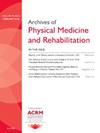Predictors of Response to Cognitive Behavioral Therapy for Sleep Disturbance and Fatigue After Acquired Brain Injury: A Secondary Analysis of a Randomized Controlled Trial
IF 3.7
2区 医学
Q1 REHABILITATION
Archives of physical medicine and rehabilitation
Pub Date : 2025-10-01
DOI:10.1016/j.apmr.2025.03.040
引用次数: 0
Abstract
Objective
To investigate factors associated with response to cognitive behavioral therapy for sleep disturbance and fatigue (CBT-SF) in individuals with acquired brain injury.
Design
Participants took part in a parent randomized controlled trial comparing an 8-week CBT-SF program with a health education control, face-to-face or via videoconferencing, and adapted for cognitive impairments. They were assessed at baseline, posttreatment, 2 months posttreatment, and 4 months posttreatment. A secondary analysis was conducted to identify which demographic, injury-related, neuropsychological, and pretreatment variables, as well as mode of treatment delivery, were associated with response to CBT-SF.
Setting
Community dwelling.
Participants
Eighty-six participants (N=86) with a traumatic brain injury (TBI) or stroke who received CBT-SF in a parent randomized controlled trial.
Interventions
CBT-SF.
Main Outcome Measures
Pittsburgh Sleep Quality Index and Fatigue Severity Scale.
Results
Greater improvements in sleep after CBT-SF were associated with higher baseline sleep disturbance, less time since injury, and telehealth mode of delivery. Larger reductions in fatigue were associated with less time since injury and higher education. Injury type (TBI and stroke) and cognitive variables were not associated with treatment outcomes.
Conclusions
These findings highlight that an adapted CBT-SF intervention can be equally effective for individuals with TBI and stroke; however, gains are greater earlier after injury. Although individuals with severe symptoms at baseline show the greatest benefit, the intervention can be effective across a range of symptom presentations.
对获得性脑损伤后睡眠障碍和疲劳的认知行为治疗反应的预测因素:一项随机对照试验的二次分析。
目的:探讨后天性脑损伤患者对认知行为治疗睡眠障碍和疲劳(CBT-SF)反应的相关因素。环境:社区住宅。参与者:在一项父母随机对照试验中,86名创伤性脑损伤(TBI)或中风患者接受CBT-SF治疗。设计:参与者参加一项家长随机对照试验,比较为期8周的CBT-SF计划与健康教育控制,面对面或通过视频会议,并适应认知障碍。分别在基线、治疗后、治疗后2个月和治疗后4个月进行评估。进行了二次分析,以确定哪些人口统计学、损伤相关、神经心理学和治疗前变量以及治疗递送模式与CBT-SF的反应相关。干预:认知行为疗法治疗睡眠障碍和疲劳主要结果测量:匹兹堡睡眠质量指数和疲劳严重程度量表。结果:CBT-SF后的睡眠改善与较高的基线睡眠障碍、较短的受伤时间和远程医疗分娩方式相关。疲劳程度的大幅降低与受伤后的时间较短和接受高等教育有关。损伤类型(TBI,卒中)和认知变量与治疗结果无关。结论:这些研究结果强调,适应性CBT-SF干预对TBI和卒中患者同样有效,然而,损伤后早期获益更大。虽然在基线时症状严重的个体获益最大,但干预措施对各种症状表现都有效。
本文章由计算机程序翻译,如有差异,请以英文原文为准。
求助全文
约1分钟内获得全文
求助全文
来源期刊
CiteScore
6.20
自引率
4.70%
发文量
495
审稿时长
38 days
期刊介绍:
The Archives of Physical Medicine and Rehabilitation publishes original, peer-reviewed research and clinical reports on important trends and developments in physical medicine and rehabilitation and related fields. This international journal brings researchers and clinicians authoritative information on the therapeutic utilization of physical, behavioral and pharmaceutical agents in providing comprehensive care for individuals with chronic illness and disabilities.
Archives began publication in 1920, publishes monthly, and is the official journal of the American Congress of Rehabilitation Medicine. Its papers are cited more often than any other rehabilitation journal.

 求助内容:
求助内容: 应助结果提醒方式:
应助结果提醒方式:


